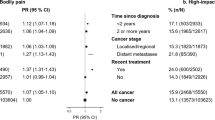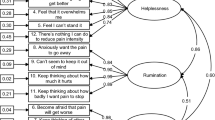Abstract
Background
Psychological distress is a significant problem among patients with a diagnosis of cancer and is associated with elevated risk for mortality; however, not all patients with a diagnosis of cancer experience significant psychological distress. Cancer-related pain has been associated with greater psychological distress among patients with a cancer diagnosis (current or previous). The current study aimed to examine potential theoretical mechanisms (i.e., cognitive fusion, experiential avoidance, and functional impairment) as proposed by the psychological flexibility model, for the association between cancer-related pain and psychological distress. We hypothesized that cancer-related pain would be indirectly positively associated with psychological distress among patients with a cancer diagnosis (current or previous) through psychological inflexibility (i.e., cognitive fusion and experiential avoidance) related to pain and functional impairment, in serial.
Method
Sixty-one adult outpatients diagnosed with cancer completed self-report assessments of cancer-related pain, psychological inflexibility related to pain, pain-related functional impairment, and psychological distress.
Results
Cancer-related pain was positively associated with psychological distress indirectly through greater pain-related psychological inflexibility (i.e., cognitive fusion and experiential avoidance) and functional impairment, in serial. Alternative models were explored but unsupported.
Conclusion
Consistent with the psychological flexibility model, psychological inflexibility and functional impairment may be potential mechanisms underlying the association between cancer-related pain and psychological distress among patients with a cancer diagnosis (current or previous).


Similar content being viewed by others
References
American Cancer Society. Cancer facts & figures 2016. Atlanta: American Cancer Society; 2016.
Wool MS, Mor V. A multidimensional model for understanding cancer pain. Cancer Investig. 2005;23:727–34.
Zabora J, BrintzenhofeSzoc K, Curbow B, Hooker C, Piantadosi S. The prevalence of psychological distress by cancer site. Psycho-oncology. 2001;10:19–28.
Hamer M, Chida Y, Molloy GJ. Psychological distress and cancer mortality. J Psychosom Res. 2009;66:255–8.
Brown KW, Levy AR, Rosberger Z, Edgar L. Psychological distress and cancer survival: a follow-up 10 years after diagnosis. Psychosom Med. 2003;65:636–43.
Adler, N. E., Page, A. E., & Institute of Medicine (US) Committee on Psychosocial Services to Cancer Patients/Families in a Community Setting. (2008). The psychosocial needs of cancer patients. In cancer care for the whole patient: meeting psychosocial health needs. National Academies Press (US).
Holland JC, Bultz BD. The NCCN guideline for distress management: a case for making distress the sixth vital sign. J Natl Compr Cancer Netw. 2007;5:3–7.
Berger AM, Visovsky C, Hertzog M, Holtz S, Loberiza FR Jr. Usual and worst symptom severity and interference with function in breast cancer survivors. J Support Oncol. 2012;10:112–8.
Keefe FJ, Abernethy AP, Campbell C, L. Psychological approaches to understanding and treating disease-related pain. Annu Rev Psychol. 2005;56:601–30.
Van den Beuken-van Everdingen, M. H. J., De Rijke, J. M., Kessels, A. G., Schouten, H. C., Van Kleef, M. (n.d.).
Bodurka-Bevers D, Basen-Engquist K, Carmack CL, Fitzgerald MA, Wolf JK, de Moor C, et al. Depression, anxiety, and quality of life in patients with epithelial ovarian cancer. Gynecol Oncol. 2000;78:302–8.
Syrjala KL, Chapko ME. Evidence for a biopsychosocial model of cancer treatment-related pain. Pain. 1995;61:69–79.
Syrjala KL, Jensen MP, Mendoza ME, Yi JC, Fisher HM, Keefe FJ. Psychological and behavioral approaches to cancer pain management. J Clin Oncol. 2014;32:1703.
Spiegel D, Sands S, Koopman C. Pain and depression in patients with cancer. Cancer. 1994;74:2570–8.
Zaza C, Baine N. Cancer pain and psychosocial factors: a critical review of the literature. J Pain Symptom Manag. 2002;24:526–42.
Hayes SC, Strosahl KD, Wilson KG. Acceptance and commitment therapy: the process and practice of mindful change. New York: Guilford Press; 2012.
Scott W, McCracken LM. Psychological flexibility, acceptance and commitment therapy, and chronic pain. Curr Opin Psychol. 2015;2:91–6.
Levin ME, Hildebrandt MJ, Lillis J, Hayes SC. The impact of treatment components suggested by the psychological flexibility model: a meta-analysis of laboratory-based component studies. Beh Therapy. 2012;43:741–56.
González-Fernández S, Fernández-Rodríguez C, Mota-Alonso MJ, García-Teijido P, Pedrosa I, Pérez-Álvarez M. Emotional state and psychological flexibility in breast cancer survivors. Eur J Oncol Nurs. 2017;30:75–83.
Feros DL, Lane L, Ciarrochi J, Blackledge JT. Acceptance and commitment therapy (ACT) for improving the lives of cancer patients: a preliminary study. Psycho-oncology. 2013;22:459–64. https://doi.org/10.1002/pon.2083.
Ferrell BR, Dean G. The meaning of cancer pain. Semin Oncol Nurs. 1995;11:17–22.
Turner JA, Jensen MP, Warms CA, Cardenas DD. Catastrophizing is associated with pain intensity, psychological distress, and pain-related disability among individuals with chronic pain after spinal cord injury. Pain. 2002;98:127–34.
Breivik H, Cherny N, Collett B, De Conno F, Filbet M, Foubert AJ, et al. Cancer-related pain: a pan-European survey of prevalence, treatment, and patient attitudes. Ann Oncol. 2009;20:1420–33.
Mystakidou K, Tsilika E, Parpa E, Katsouda E, Galanos A, Vlahos L. Psychological distress of patients with advanced cancer: influence and contribution of pain severity and pain interference. Cancer Nurs. 2006;29:400–5.
Wicksell RK, Renöfält J, Olsson GL, Bond FW, Melin L. Avoidance and cognitive fusion–central components in pain related disability? Development and preliminary validation of the psychological inflexibility in pain scale (PIPS). Eur J Pain. 2008;12:491–500.
Wicksell RK, Olsson GL, Hayes SC. Psychological flexibility as a mediator of improvement in acceptance and commitment therapy for patients with chronic pain following whiplash. Eur J Pain. 2010;14:1059–e1. https://doi.org/10.1016/j.ejpain.2010.05.001.
Cleeland CS. Assessment of pain in cancer: measurement issues. In: Foley KM, editor. Advances in Pain Research and Therapy, vol. 16. New York: Raven Press; 1990. p. 47–55.
Zelman DC, Gore M, Dukes E, Tai KS, Brandenburg N. Validation of a modified version of the brief pain inventory for painful diabetic peripheral neuropathy. J Vasc Nurs. 2005;23:97–104.
National Comprehension Cancer Network. Distress management clinical practice guidelines. J Natl Compr Cancer Netw. 2003;1:344–74.
Hayes AF. Introduction to mediation, moderation, and conditional process analysis: a regression-based approach. New York: Guilford Press; 2013.
Baron RM, Kenny DA. The moderator–mediator variable distinction in social psychological research: conceptual, strategic, and statistical considerations. J Pers Soc Psychol. 1986;51:1173. https://doi.org/10.1037/0022-3514.51.6.1173.
Preacher KJ, Kelley K. Effect size measures for mediation models: quantitative strategies for communicating indirect effects. Psychol Methods. 2011;16:93–115. https://doi.org/10.1037/a0022658.
R Core Team (2019). R: A language and environment for statistical computing (version 3.6.1) [Computer software]. Vienna, Austria: R Foundation for Statistical Computing. Retrieved from the comprehensive R archive network (CRAN): https://www.R-project.org/. Accessed 13 Aug 2019.
Schoemann AM, Boulton AJ, Short SD. Determining power and sample size for simple and complex mediation models. Soc Psychol Personal Sci. 2017;8:379–86. https://doi.org/10.1177/1948550617715068.
Hayes SC, Barnes-Holmes D, Wilson KG. Contextual behavioral science: creating a science more adequate to the challenge of the human condition. J Contextual Behav Sci. 2012;1:1–16.
Wetherell JL, Afari N, Rutledge T, Sorrell JT, Stoddard JA, Petkus AJ, et al. A randomized, controlled trial of acceptance and commitment therapy and cognitive-behavioral therapy for chronic pain. Pain. 2011;152:2098–107.
Kroenke K, Wu J, Bair MJ, Krebs EE, Damush TM, Tu W. Reciprocal relationship between pain and depression: a 12-month longitudinal analysis in primary care. J Pain. 2011;12:964–73. https://doi.org/10.1016/j.jpain.2011.03.003.
Author information
Authors and Affiliations
Corresponding author
Ethics declarations
All procedures performed in studies involving human participants were in accordance with the ethical standards of the institutional and/or national research committee and with the 1964 Helsinki Declaration and its later amendments or comparable ethical standards. Informed consent was obtained from all individual participants included in the study.
Additional information
Publisher’s Note
Springer Nature remains neutral with regard to jurisdictional claims in published maps and institutional affiliations.
Rights and permissions
About this article
Cite this article
Brown, S.L., Roush, J.F., Marshall, A.J. et al. The Intervening Roles of Psychological Inflexibility and Functional Impairment in the Relation between Cancer-related Pain and Psychological Distress. Int.J. Behav. Med. 27, 100–107 (2020). https://doi.org/10.1007/s12529-019-09838-8
Published:
Issue Date:
DOI: https://doi.org/10.1007/s12529-019-09838-8




